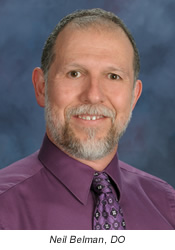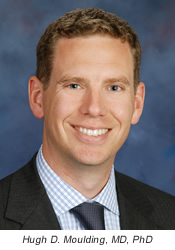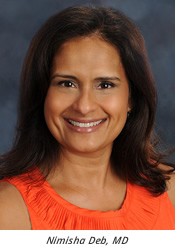Case study: “JB” is a 52 year old woman whose medical history includes smoking for five years during her twenties. She presented with a cough. Investigation showed a left lung mass with adrenal metastases. A biopsy of the adrenal gland showed metastatic lung cancer. An MRI of her brain showed a small metastatic focus in the right hemisphere. She had no neurologic symptoms. Chemotherapy was recommended and she was referred to St. Luke’s Brain & Spine Tumor Center (BSTC) to consider how best to treat her brain lesion.
About three years ago, the team of specialists was formed to discuss cases like the one above.
According to Neil Belman, DO, of St. Luke’s Hematology Oncology Specialists, this patient story is just one of nearly 20 unique cases reviewed each week by the multidisciplinary team of specialists at the St. Luke’s Brian & Spine Tumor Center. Dr. Belman serves as a team member. “We evaluate patients with a variety of conditions including various primary brain and nervous system tumors, as well as many different tumor types that may extend to the brain or spinal cord,” he says.
The care team, known as the neuro-oncology working group, is a collaboration of physicians from neurosurgery, radiation therapy, medical oncology and neuroradiology. “Each physician brings a different perspective to each unique case, with the goal of developing a cohesive treatment plan tailored to each patient,” says Dr. Belman. “There is a natural cross-fertilization of ideas as each specialist engages with the interlinking disciplines so the most appropriate diagnostic or therapeutic recommendations can be made.”
With regular meetings in place, a clinic with the patients followed. “The clinic allows patients to visit with one or several participating physicians as the need arises,” says Dr. Belman. Clinics are held weekly in the Radiation Oncology department at St. Luke’s Cancer Center – Anderson Campus.
Since the physicians from the various disciplines are all present at the clinic, treatment decisions can be adjusted in real time as new data or patient circumstances change. A nurse navigator also is present to implement treatment plans and coordinate studies among the various departments. Her work continues between clinics to keep patients on track with treatment plans.
“These efforts have resulted in efficient care as visits are completely coordinated between the disciplines,” says Dr. Belman. “As a result, patients endure fewer visits, diagnostic testing is streamlined, reducing or eliminating unnecessary tests; costs are reduced; and patients have a better experience.”
Relevant research protocols are also available through the clinic, with research nurses visiting patients on the same day as doctor visits.
A coordinated multidisciplinary approach to cancer care as the one provided through St. Luke’s Brain & Spine Tumor Center translates into optimal care with reduced stress and anxiety for patients and families, according to Dr. Belman. “Our goal is to bring this proven care model to other tumor types,” he says.
St. Luke’s Brain & Spine Tumor Center provides the region’s only patient-centered multidisciplinary clinic for primary and metastatic diseases of the brain and spine. The center gives the patient an opportunity to meet a multidisciplinary team of doctors from neurosurgery, radiation therapy and medical oncology at one time and one location. By bringing together physician expertise in these highly specialized areas, St. Luke’s offers patients a cohesive, comprehensive, personalized treatment plan tailored to the each patient’s diagnoses and unique needs without the need for the patient to travel to multiple locations and physicians. Patients benefit from innovative surgical, medical and radiation oncology treatment approaches and access to the latest clinical trials and investigational therapies. A nurse navigator also is present to implement treatment plans and coordinate studies among the various departments. Her work continues between clinics to keep patients on track with treatment plans.
Hugh Moulding, MD, PhD serves as the Medical Director, St. Luke’s Brain & Spine Tumor Program. He completed his fellowship in neurosurgical oncology at Memorial Sloan Kettering Cancer Center. Dr. Moulding is joined by radiation oncologist Dr. Nimisha Deb and medical oncologist Dr. Neil Belman.






